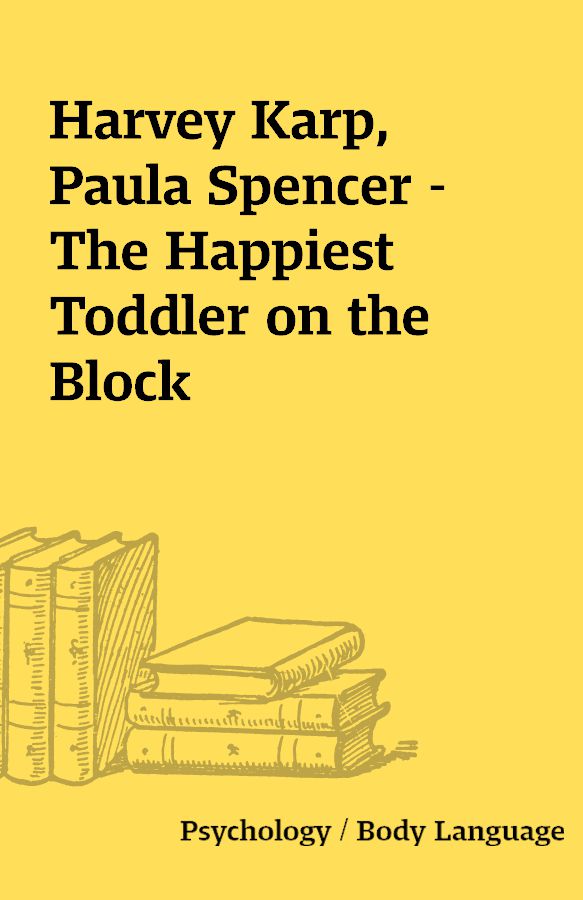Harvey Karp, Paula Spencer – The Happiest Toddler on the Block
The Happiest Toddler On The Block
[8 CDs – MP3]
Description
From Publishers WeeklyCalifornia-based pediatrician Karp offers a unique approach to the tantrums, melt-downs and overriding challenges that often accompany the demanding years from one to four. Viewing toddlers as primitive thinkers akin to prehistoric man, Karp divides his patients into developmental groups: the “Charming Chimp-Child” (12 to 18 months), the “Knee-High Neanderthal” (18 to 24 months), the “Clever Cave-Kid” (24 to 36 months) and the “Versatile Villager” (36 to 48 months). Parents may find the toddler years so frustrating, Karp suggests, because they don’t speak their child’s language. To deal effectively with the undeveloped brains of toddlers, one must understand “Toddler-ese,” he says, a method of talking to youngsters that employs short phrases, repetition, a dramatic tone of voice and the use of body language. Although the author admits parents may feel foolish speaking in this manner, he nevertheless maintains that the approach soothes children by respecting their needs. Additionally, Karp offers suggestions for positive discipline (e.g., loss of privileges and time out) and guides parents through early expected milestones, while acknowledging that a child’s individual temperament (e.g., easy, cautious, spirited) will uniquely influence the pace of his or her development. While some readers may find the relentless cave-kid metaphors irksome, Karp’s gentle, easygoing tone is soothing and offers new hope and strategies to those who may have given up on making sense of the toddler years.Copyright © Reed Business Information, a division of Reed Elsevier Inc. All rights reserved. –This text refers to the Hardcover edition.Book DescriptionToddlers can drive you bonkers…so adorable and fun one minute…so stubborn and demanding the next! Yet, as unbelievable as it sounds, there is a way to turn the daily stream of “nos” and “don’ts” into “yeses” and hugs…if you know how to speak your toddler’s language. In one of the most useful advances in parenting techniques of the past twenty-five years, Dr. Karp reveals that toddlers, with their immature brains and stormy outbursts, should be thought of not as pint-size people but as pintsize…cavemen.Having noticed that the usual techniques often failed to calm crying toddlers, Dr. Karp discovered that the key to effective communication was to speak to them in their own primitive language. When he did, suddenly he was able to soothe their outbursts almost every time! This amazing success led him to the realization that children between the ages of one and four go through four stages of “evolutionary” growth, each linked to the development of the brain, and each echoing a step in prehistoric humankind’s journey to civilization:• The “Charming Chimp-Child” (12 to 18 months): Wobbles around on two legs, grabs everything in reach, plays a nonstop game of “monkey see monkey do.”• The “Knee-High Neanderthal” (18 to 24 months): Strong-willed, fun-loving, messy, with a vocabulary of about thirty words, the favorites being “no” and “mine.”• The “Clever Caveman” (24 to 36 months):Just beginning to learn how to share, make friends, take turns, and use the potty.• The “Versatile Villager” (36 to 48 months): Loves to tell stories, sing songs and dance, while trying hard to behave.To speak to these children, Dr. Karp has developed two extraordinarily effective techniques:1) The “fast food” rule—restating what your child has said to make sure you got it right;2) The four-step rule—using gesture, repetition, simplicity, and tone to help yourirate Stone-Ager be happy again.Once you’ve mastered “toddler-ese,” you will be ready to apply behavioral techniques specific to each stage of your child’s development, such as teaching patience and calm, doing time-outs (and time-ins), praise through “gossiping,” and many other strategies. Then all the major challenges of the toddler years—including separation anxiety, sibling rivalry, toilet training, night fears, sleep problems, picky eating, biting and hitting, medicine taking — can be handled in a way that will make your toddler feel understood. The result: fewer tantrums, less yelling, and, best of all, more happy, loving time for you and your child. –This text refers to the Hardcover edition.
You must be logged in to post a review.






Reviews
There are no reviews yet.